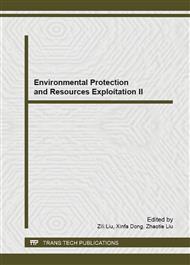p.1949
p.1957
p.1963
p.1969
p.1976
p.1980
p.1985
p.1989
p.1993
Research on the Dynamic Relationship between Energy Consumption Structure and Economic Growth in China
Abstract:
With the increasingly development of economy in China, economic growth and efficient use of energy is a hot topic in recent years, also China is under pressure of carbon emissions reductions during the process of economic development. This paper try to do a research to find weather the structure of energy consumption and economic growth exist long-term dynamic equilibrium relationship. Based on VAR model, though Granger causality test, impulse response and variance decomposition, combined with China's development of low-carbon economy, in the years between1978 to 2012 , four results has been showed: First, China's economic growth and energy consumption exist a stable long-run equilibrium relationship. Second, at the 1% level, there is a two-way Granger causality coal consumption and economic growth. Third, in lag 4, the energy consumption is produced positive effects on economic growth and the impact of coal consumption has maximum affect. Forth, the development and utilization of renewable energy is an effective way to solve China's economic development and energy constraints contradictory.
Info:
Periodical:
Pages:
1976-1979
Citation:
Online since:
August 2014
Authors:
Keywords:
Price:
Сopyright:
© 2014 Trans Tech Publications Ltd. All Rights Reserved
Share:
Citation:


